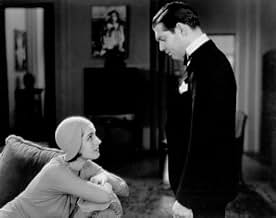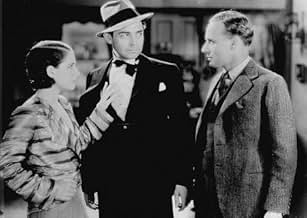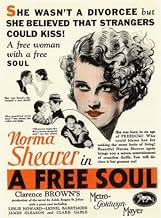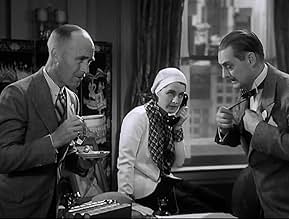NOTE IMDb
6,6/10
3,1 k
MA NOTE
Un avocat alcoolique qui a défendu avec succès un joueur notoire accusé de meurtre s'oppose à ce que sa fille libre-esprit s'engage dans une relation avec lui.Un avocat alcoolique qui a défendu avec succès un joueur notoire accusé de meurtre s'oppose à ce que sa fille libre-esprit s'engage dans une relation avec lui.Un avocat alcoolique qui a défendu avec succès un joueur notoire accusé de meurtre s'oppose à ce que sa fille libre-esprit s'engage dans une relation avec lui.
- Réalisation
- Scénario
- Casting principal
- Récompensé par 1 Oscar
- 4 victoires et 2 nominations au total
Roscoe Ates
- Man Shot at in Men's Room
- (non crédité)
Ann Brody
- Hamburger Saleslady
- (non crédité)
Edward Brophy
- Slouch
- (non crédité)
Clarence Burton
- Detective
- (non crédité)
James Donlan
- Reporter
- (non crédité)
Bess Flowers
- Birthday Party Guest
- (non crédité)
Francis Ford
- Skid Row Drunk
- (non crédité)
Henry Hall
- Detective in Raid
- (non crédité)
George Irving
- Johnson - Defense Attorney
- (non crédité)
Edward LeSaint
- Judge
- (non crédité)
Eric Mayne
- Party Guest
- (non crédité)
Sam McDaniel
- Casino Valet
- (non crédité)
Avis à la une
For those of you who did not have the dubious pleasure of seeing one of Elizabeth Taylor's lesser films, The Girl Who Had Everything, here's the original film it was taken from. A Free Soul is the story of a girl who misuses the freedom her father gave her in her upbringing.
The film is based on a story Adela Rogers St. John wrote, that drew from her relationship with her father, famed criminal defense attorney Earl Rogers. Rogers set the mold for the famous criminal attorneys we've seen in action down to today. Unfortunately he was a man with a severe drinking problem which in the end got the better of him.
He did not come from the upper crust that Lionel Barrymore as Stephen Ashe comes from. In fact the real Earl Rogers's father was a minister. Yet Barrymore creates a compelling and brilliant, but dissolute figure who raises his daughter to be broadminded and tolerant and to despise some of the snobs from her class.
Norma Shearer takes the lessons to heart only too well. She leaves stalwart beau, polo playing Leslie Howard, for gambler/racketeer Clark Gable. Gable's a client of Barrymore's who Barrymore got off on a gambit that Johnnie Cochran used successfully defending O.J. Simpson and he's rather full of himself.
Barrymore turns out to be a bit of a snob himself in the end, telling Gable he's not good enough for his little girl. Of course Norma has her own ideas.
This film was the first really big break for Clark Gable. Movie audiences went for his animal magnetism in a big way. Even though Barrymore won the Best Actor Oscar for his performance by virtue of an unforgettable courtroom speech at the finish, it was Gable who got all the newspaper print.
Norma Shearer got a Best Actress nomination, but lost to fellow MGM contract player Marie Dressler for Min and Bill. A Free Soul which was a pre-Code film, explored the theme of sexual satisfaction ever so gingerly, but in a way after 1935 could not be seen for thirty years on the screen. Shearer is also giving one of her best screen performances.
Leslie Howard I'm afraid had real little to do, but look patient and noble as the society polo player. Howard exuded class and distinction even when he's penniless as in The Petrified Forest. So much the better for him when he's dressed in tails.
A Free Soul is light years better than The Girl Who Had Everything and holds up very well for today's audience.
The film is based on a story Adela Rogers St. John wrote, that drew from her relationship with her father, famed criminal defense attorney Earl Rogers. Rogers set the mold for the famous criminal attorneys we've seen in action down to today. Unfortunately he was a man with a severe drinking problem which in the end got the better of him.
He did not come from the upper crust that Lionel Barrymore as Stephen Ashe comes from. In fact the real Earl Rogers's father was a minister. Yet Barrymore creates a compelling and brilliant, but dissolute figure who raises his daughter to be broadminded and tolerant and to despise some of the snobs from her class.
Norma Shearer takes the lessons to heart only too well. She leaves stalwart beau, polo playing Leslie Howard, for gambler/racketeer Clark Gable. Gable's a client of Barrymore's who Barrymore got off on a gambit that Johnnie Cochran used successfully defending O.J. Simpson and he's rather full of himself.
Barrymore turns out to be a bit of a snob himself in the end, telling Gable he's not good enough for his little girl. Of course Norma has her own ideas.
This film was the first really big break for Clark Gable. Movie audiences went for his animal magnetism in a big way. Even though Barrymore won the Best Actor Oscar for his performance by virtue of an unforgettable courtroom speech at the finish, it was Gable who got all the newspaper print.
Norma Shearer got a Best Actress nomination, but lost to fellow MGM contract player Marie Dressler for Min and Bill. A Free Soul which was a pre-Code film, explored the theme of sexual satisfaction ever so gingerly, but in a way after 1935 could not be seen for thirty years on the screen. Shearer is also giving one of her best screen performances.
Leslie Howard I'm afraid had real little to do, but look patient and noble as the society polo player. Howard exuded class and distinction even when he's penniless as in The Petrified Forest. So much the better for him when he's dressed in tails.
A Free Soul is light years better than The Girl Who Had Everything and holds up very well for today's audience.
I thought A Free Soul an interesting exploration into the world of addiction--father Stephen Ashe, as played by Lionel Barrymore, struggles to balance his career as a defense lawyer and the disastrous effects his alcoholism has on his family and social life. Daughter Jan (Norma Shearer) has a similar problem--but her addiction is to a free and easy lifestyle, with no commitments and no responsibility. Both seem to be ways of dealing with an unspoken loss--perhaps that of a wife and mother. Again, as with all good storytelling, backstory is only hinted at but the characters are rich enough to imply a great deal of history. Refreshing to see Clark Gable as a suave, handsome but ultimately despicable character. A surprising lack of stereotypes for such a film-the Ashes are a patrician, proper family who virtually disown Stephen and his daughter, but they are shown to be intelligent, unique people none the less. A wonderful, melodramatic exploration of the relationship of a father and daughter. Some nice location work for an early talkie.
To get an idea of how great magnetic and radiant shearer is here, consider that she matches her scenes with Clark Gable, lionel Barrymore and Leslie Howard and wipes the floor with all of them.
Don't get me wrong they are all very good here but this movie is a star vehicle for shearer and it is her movie. She does all of the shining.
If you appreciate her, this movie is a must see even though the film drags on and the script is average at best.
I wouldn't be surprised if this served as an inspiration to courtroom dramas like Perry Mason and Matlock later on.
Johnny Cochrane must've learned some legal tricks from this old movie. For example, at the beginning of the movie, Lionel Barrymore gets Clark Gable acquitted of first degree murder when he places the hat found at the scene of the crime on Clark's head ... clearly the hat is too small. The court and jury laugh, and Clark is set free!
This entire movie was great -- much better than I had expected. I saw two Norma Shearer movies recently with a similar-sounding plot recap: Their Own Desire (Norma Shearer falls for the son of her father's illicit lover), and this one, A Free Soul (Norma Shearer falls for her lawyer father's mobster client). Having watched Their Own Desire first and not being impressed with it, I wondered if I should even bother with A Free Soul. But bother I did, and I'm glad for it. It was an excellent movie.
Lionel Barrymore is the black sheep of his snooty, well-heeled family. His wife died while giving birth to their only child, Jan (Norma Shearer). Being the black sheep, Lionel raised Norma to be a "free soul", to not be afraid of anyone or anything, to not be afraid to make mistakes, and to pick herself up and dust herself off whenever she did find herself in trouble. This has apparently worked well for Norma, until she meets and eventually tries to get away from Clark Gable. Norma finally learns there are consequences to all actions, that one can't be a "free soul" without it having some type of repercussion on one's life.
We also have Lionel Barrymore (whom I always love in anything I see him in) this time very compelling as a brilliant alcoholic lawyer who loves his daughter more than anything but who ultimately doesn't know how to protect her. He disappoints her, and he disappoints himself, but in the end he seeks to right his wrongs by defending Norma's ex-fiancé (to say more would be to possibly spoil the movie).
This movie was fresh, and the characters were sympathetically developed without ever resorting to being maudlin or melodramatic. This movie was also chock-full of great lines. For example:
(Lionel to Clark, upon learning Clark wants to marry Norma) - "The only time I hate democracy is when one of you mongrels forgets where you belong!"
(Norma to Clark, trying to get Clark to quit talking and make love to her) - "Men of action are better in action; they don't talk well."
Great early pre-code movie.
This entire movie was great -- much better than I had expected. I saw two Norma Shearer movies recently with a similar-sounding plot recap: Their Own Desire (Norma Shearer falls for the son of her father's illicit lover), and this one, A Free Soul (Norma Shearer falls for her lawyer father's mobster client). Having watched Their Own Desire first and not being impressed with it, I wondered if I should even bother with A Free Soul. But bother I did, and I'm glad for it. It was an excellent movie.
Lionel Barrymore is the black sheep of his snooty, well-heeled family. His wife died while giving birth to their only child, Jan (Norma Shearer). Being the black sheep, Lionel raised Norma to be a "free soul", to not be afraid of anyone or anything, to not be afraid to make mistakes, and to pick herself up and dust herself off whenever she did find herself in trouble. This has apparently worked well for Norma, until she meets and eventually tries to get away from Clark Gable. Norma finally learns there are consequences to all actions, that one can't be a "free soul" without it having some type of repercussion on one's life.
We also have Lionel Barrymore (whom I always love in anything I see him in) this time very compelling as a brilliant alcoholic lawyer who loves his daughter more than anything but who ultimately doesn't know how to protect her. He disappoints her, and he disappoints himself, but in the end he seeks to right his wrongs by defending Norma's ex-fiancé (to say more would be to possibly spoil the movie).
This movie was fresh, and the characters were sympathetically developed without ever resorting to being maudlin or melodramatic. This movie was also chock-full of great lines. For example:
(Lionel to Clark, upon learning Clark wants to marry Norma) - "The only time I hate democracy is when one of you mongrels forgets where you belong!"
(Norma to Clark, trying to get Clark to quit talking and make love to her) - "Men of action are better in action; they don't talk well."
Great early pre-code movie.
They are alike, this father & daughter. Liberal, passionate, willful - they live life on their own terms, disdaining their narrow-minded relations. Few regrets & even fewer apologies cloud either conscious - yet each harbors a character trait that threatens to destroy them. Hers is emotional instability; his, acute alcoholism. Although both will make bad choices that will haunt them, each will continue to see their reflection in the other, unique & individual, A FREE SOUL.
Based on a book by Adela Rogers St. Johns, Norma Shearer gets top billing in this aged but enjoyable soap opera, and she is very good, turning on the histrionics most effectively. But it is Lionel Barrymore who gets full honors - and a Best Actor Oscar - for his portrayal of her brilliant, tragic, lawyer father. Masterfully, he dominates his every scene. His final appearance, a tempestuous summation to a murder trial jury, is considered a classic.
Playing the two very different men in Shearer's life are Clark Gable & Leslie Howard. Gable is excellent, oozing the virility that was about to make him a huge star. Howard deftly underplays his less flashy role and becomes the film's calm center. James Gleason as Barrymore's factotum, and Lucy Beaumont as Barrymore's patrician mother, both give memorable performances. Film mavens will spot Edward Brophy as one of Gable's henchmen & master stutterer Roscoe Ates as the man in the washroom window.
Based on a book by Adela Rogers St. Johns, Norma Shearer gets top billing in this aged but enjoyable soap opera, and she is very good, turning on the histrionics most effectively. But it is Lionel Barrymore who gets full honors - and a Best Actor Oscar - for his portrayal of her brilliant, tragic, lawyer father. Masterfully, he dominates his every scene. His final appearance, a tempestuous summation to a murder trial jury, is considered a classic.
Playing the two very different men in Shearer's life are Clark Gable & Leslie Howard. Gable is excellent, oozing the virility that was about to make him a huge star. Howard deftly underplays his less flashy role and becomes the film's calm center. James Gleason as Barrymore's factotum, and Lucy Beaumont as Barrymore's patrician mother, both give memorable performances. Film mavens will spot Edward Brophy as one of Gable's henchmen & master stutterer Roscoe Ates as the man in the washroom window.
Le saviez-vous
- AnecdotesWhen the mule chases James Gleason, not a stuntman, is knocked down by the animal, a scene which wasn't planned, as Norma Shearer's reaction attests.
- GaffesAfter the cross-examination finishes, Stephen Ashe begins his summation to the jury. However, he is the defense attorney, and the prosecutor takes the first summation. This "factual mistake" is, in fact, not an absolute, as it depends on the state where the trial is held. For example, in a criminal case (which this is) in the Commonwealth of Pennsylvania, the defense goes first and the Commonwealth last. (If it were a civil case in PA, the Plaintiff would go first.)
- ConnexionsFeatured in Some of the Best (1944)
- Bandes originalesBy the River Sainte Marie
(1931) (uncredited)
Music by Harry Warren
Played as background music during the restaurant scene
Meilleurs choix
Connectez-vous pour évaluer et suivre la liste de favoris afin de recevoir des recommandations personnalisées
- How long is A Free Soul?Alimenté par Alexa
Détails
- Date de sortie
- Pays d’origine
- Langue
- Aussi connu sous le nom de
- Un alma libre
- Lieux de tournage
- Yosemite National Park, Californie, États-Unis(Jan, her father and Eddie go camping)
- Société de production
- Voir plus de crédits d'entreprise sur IMDbPro
Box-office
- Budget
- 529 000 $US (estimé)
- Durée
- 1h 33min(93 min)
- Couleur
Contribuer à cette page
Suggérer une modification ou ajouter du contenu manquant




























